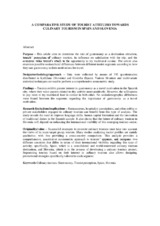A comparative study of tourist attitudes towards culinary tourism in Spain and Slovenia
Autor
Sánchez Cañizares, Sandra María
Castillo-Canalejo, Ana M
Editor
EmeraldFecha
2015Materia
Culinary tourismGastronomy
Tourist perception
Spain
Slovenia
METS:
Mostrar el registro METSPREMIS:
Mostrar el registro PREMISMetadatos
Mostrar el registro completo del ítemResumen
Purpose – This article aims to determine the role of gastronomy as a destination attraction, tourists’ perception of culinary tourism, its influence on satisfaction with the trip, and the economic value tourist’s attach to the opportunity to try traditional cuisine. The article also examines possible sociocultural differences between different tourist segments according to how they rate gastronomy in their motivations for travel.
Design/methodology/approach – Data were collected by means of 392 questionnaires distributed in Ljubjlana (Slovenia) and Cordoba (Spain). Various bivariate and multivariate statistical techniques are used to perform a comprehensive econometric study.
Findings – Tourists exhibit greater interest in gastronomy as a travel motivation in the Spanish city, where they value aspects related to this activity more positively. However, the willingness to pay more to try traditional food is similar in both cities. No sociodemographic differences were found between the segments regarding the importance of gastronomy as a travel motivation.
Research limitations/implications – Restaurateurs, hospitality associations, and other public or private stakeholders engaged in culinary tourism can benefit from this type of analysis. The study reveals the need to improve language skills, human capital formation and the innovation of traditional dishes in the Spanish sample. It also shows that the future of culinary tourism in Slovenia will depend on enhancing the international visibility of this emerging tourism sector. Originality/value – Successful strategies to promote culinary tourism must take into account the views of its main target group, tourists. Many studies analyzing tourist profiles are mainly qualitative, with few providing a cross-country comparison. This analysis provides a comprehensive, quantitative econometric approach to tourists’ opinions, and compares two different countries that differ in terms of their international visibility regarding this type of activity; specifically, Spain, which is a consolidated and world-renowned culinary tourism destination, and Slovenia, which is in the process of developing a culinary tourism project. Segmenting tourists based on their interest in culinary tourism also allows designing promotional strategies specifically tailored to each segment.

